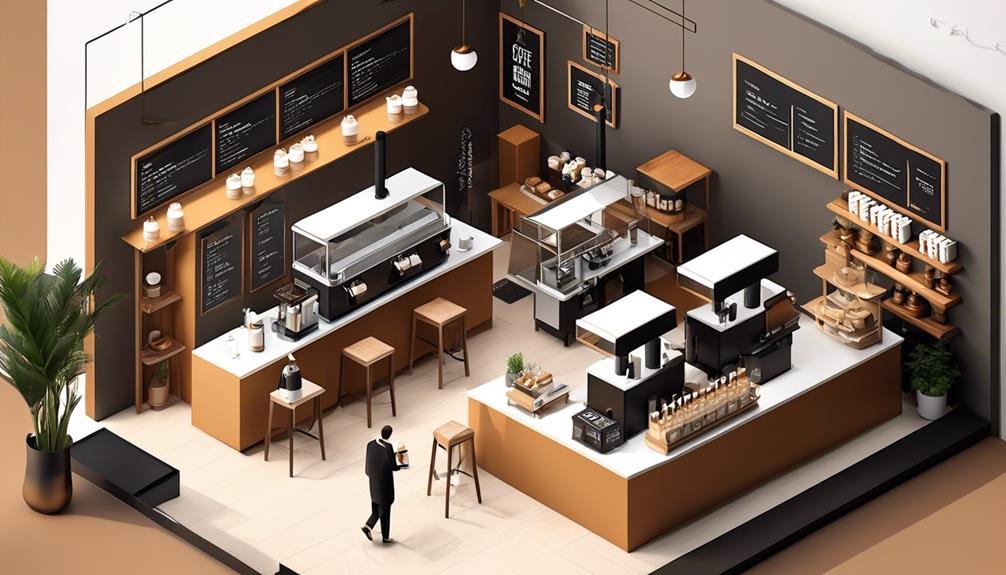Did you know that the global specialty coffee market is expected to reach a value of $83.6 billion by 2025? With such a significant market size, it's no wonder that more and more people are curious about the concept of third wave coffee.
But what exactly is third wave coffee and why is it gaining so much attention? In this discussion, we will explore the origins of third wave coffee, its key characteristics, and the impact it has on farmers and sustainability.
Get ready to dive into the world of coffee craftsmanship and discover why third wave coffee has become a cultural phenomenon.
Key Takeaways
- Third wave coffee emerged in the 1980s as a response to the mass production and uniformity of second wave coffee.
- It emphasizes single-origin sourcing, direct relationships with farmers, and meticulous roasting and brewing techniques.
- Third wave coffee places heavy emphasis on education and transparency, with baristas becoming knowledgeable guides for customers.
- It has revolutionized the perception, sourcing, and enjoyment of coffee, with a focus on quality, traceability, and artisanal craftsmanship.
Origins of Third Wave Coffee
The origins of Third Wave Coffee can be traced back to the 1980s when a group of passionate coffee enthusiasts ignited a movement that would revolutionize the way coffee is perceived, brewed, and enjoyed. Prior to this period, coffee was predominantly seen as a commodity, with little attention given to its quality or flavor. However, these pioneers saw coffee as an artisanal product that deserved the same level of craftsmanship and appreciation as wine or chocolate.
The Third Wave Coffee movement emerged as a response to the mass production and uniformity that characterized the second wave of coffee, which saw the rise of chains like Starbucks. These enthusiasts sought to highlight the unique characteristics of coffee beans, emphasizing the importance of single-origin sourcing, direct relationships with farmers, and meticulous roasting and brewing techniques.
This movement also placed a heavy emphasis on education and transparency. Baristas became more than just coffee makers; they became knowledgeable guides, educating customers about the origins, flavors, and brewing methods of the coffee they were consuming. This focus on education allowed consumers to develop a deeper appreciation for the complexities of coffee and empowered them to make informed choices about their brew.
Key Characteristics of Third Wave Coffee
With an understanding of the origins and motivations behind Third Wave Coffee, we can now explore the key characteristics that define this revolutionary movement.
- Focus on Quality: Third Wave Coffee places a strong emphasis on the quality of the coffee beans. From the sourcing of the beans to the roasting process, every step is meticulously executed to ensure the best possible flavor profile.
- Direct Trade: Third Wave Coffee promotes direct trade relationships between coffee farmers and roasters. This bypasses traditional middlemen, allowing farmers to receive fair compensation for their hard work and dedication.
- Single-Origin Coffee: Third Wave Coffee celebrates the unique flavors and characteristics of coffee beans from specific regions or even individual farms. By highlighting the distinct qualities of each origin, coffee enthusiasts can truly appreciate the complexity and diversity within the world of coffee.
- Artisanal Brewing Methods: Third Wave Coffee enthusiasts often use artisanal brewing methods, such as pour-over, French press, or espresso machines, to extract the full potential of the coffee beans. These methods require skill, precision, and a deep understanding of the brewing process.
Difference Between Third Wave Coffee and Previous Waves
Differentiating itself from previous waves, Third Wave Coffee embodies a transformative approach to the coffee industry, revolutionizing the way we perceive, source, and enjoy our daily cup of joe. Unlike the first wave, which focused on mass production and convenience, and the second wave, which emphasized the specialty coffee experience, the third wave is characterized by its meticulous attention to every step of the coffee production process.
One key difference between third wave coffee and previous waves is the emphasis on quality and traceability. Third wave coffee roasters prioritize sourcing high-quality, specialty-grade beans from specific regions or farms, often building direct relationships with farmers. This focus on traceability allows consumers to know exactly where their coffee comes from, promoting transparency and sustainability within the industry.
Another distinguishing factor is the commitment to artisanal craftsmanship. Third wave coffee shops often roast their own beans in-house, allowing for greater control over the flavor profile and freshness of the coffee. Baristas are trained extensively on brewing techniques, striving to extract the best flavors from each bean.
Furthermore, the third wave promotes a shift in consumer mentality. It encourages coffee drinkers to appreciate the nuances of flavor, similar to the way one might approach wine or chocolate tasting. This new mindset fosters a deeper appreciation for the complexity and diversity of coffee, encouraging exploration and experimentation in brewing methods and flavor profiles.
The Rise of Specialty Coffee Shops
As the third wave of coffee continues to reshape the industry, a notable development has been the exponential growth of specialty coffee shops. These establishments have become the go-to destinations for coffee lovers seeking a unique and high-quality experience.
Here are four key reasons why specialty coffee shops have risen in popularity:
- Emphasis on quality: Specialty coffee shops place a strong emphasis on sourcing and roasting high-quality beans. They often work directly with coffee farmers and invest in sustainable practices to ensure the best possible coffee experience for their customers.
- Craftsmanship and skill: In specialty coffee shops, baristas are highly trained professionals who take pride in their craft. They have a deep understanding of coffee brewing techniques and are able to create customized beverages tailored to individual preferences.
- Focus on flavor profiles: Specialty coffee shops offer a wide range of coffee beans from various regions, each with its own unique flavor profile. They encourage customers to explore and appreciate the nuances of different coffees, helping to elevate the overall coffee experience.
- Community and education: Specialty coffee shops cultivate a sense of community by providing a space for coffee enthusiasts to connect and learn. They often host educational events, such as cupping sessions and brewing workshops, to share their knowledge and passion for coffee.
The rise of specialty coffee shops has undoubtedly contributed to the growth of the third wave coffee movement. With their commitment to quality, craftsmanship, flavor exploration, and community engagement, these establishments have transformed coffee consumption into a truly enriching experience.
Impact of Third Wave Coffee on Farmers and Sustainability
The impact of the third wave coffee movement on farmers and sustainability can't be underestimated. This movement, characterized by a focus on quality, transparency, and ethical sourcing, has brought about significant changes in the coffee industry.
For farmers, the third wave has meant better prices, increased market access, and improved livelihoods. The emphasis on high-quality beans has led to a shift towards specialty coffee, which commands a premium price. As a result, farmers are now able to earn a fairer share of the profits, enabling them to invest in their farms, improve their techniques, and provide better living conditions for their families.
Furthermore, the third wave has also prioritized sustainability in coffee production. This includes environmentally friendly farming practices, such as organic and shade-grown cultivation, as well as a commitment to social responsibility. Many third wave coffee companies actively support initiatives aimed at improving the lives of coffee farmers, such as fair trade certifications, direct trade relationships, and community development programs.
Exploring the Future of Third Wave Coffee
Building on the impact of the third wave coffee movement on farmers and sustainability, the future of third wave coffee holds promising opportunities for continued growth and innovation.
As the industry evolves, here are four key areas to watch out for:
- Sourcing and Transparency: Third wave coffee enthusiasts have a deep appreciation for the story behind their cup of joe. In the future, expect to see increased emphasis on sourcing practices and transparency in the supply chain. From direct trade relationships with farmers to traceability of beans, consumers will have access to information that promotes ethical and sustainable choices.
- Technology and Brewing Methods: The third wave coffee movement has already witnessed a proliferation of specialty brewing methods like pour-over, Aeropress, and cold brew. In the future, advancements in technology will likely bring new brewing techniques and equipment, allowing coffee connoisseurs to experiment with flavors and extraction methods like never before.
- Alternative Milk Options: With the rise of plant-based diets, alternative milk options have gained popularity. In response, third wave coffee shops are offering a variety of non-dairy alternatives such as oat, almond, and soy milk. As the demand for these options continues to grow, expect to see even more innovative options in the future.
- Sustainability Initiatives: As sustainability becomes an increasingly important focus for consumers, the future of third wave coffee will see a greater commitment to eco-friendly practices. This includes everything from compostable packaging to reducing waste in the production process. By prioritizing sustainability, the industry will strive to minimize its environmental impact and contribute to a more sustainable future.
With these exciting developments on the horizon, the future of third wave coffee looks bright. As consumers become more educated and demanding, the industry will continue to evolve, pushing boundaries and redefining what it means to enjoy a truly exceptional cup of coffee.
Frequently Asked Questions
How Has the Concept of Third Wave Coffee Impacted the Global Coffee Industry?
The concept of third wave coffee has revolutionized the global coffee industry. It has elevated the quality and appreciation of coffee, creating a demand for specialty coffee and inspiring a wave of artisanal coffee shops.
What Are Some Common Misconceptions About Third Wave Coffee?
Some common misconceptions about third wave coffee include thinking it's just a trend or that it's all about fancy equipment. In reality, it's a movement focused on quality, sustainability, and appreciation for the intricate flavors of coffee.
How Does the Third Wave Coffee Movement Contribute to Local Economies?
The third wave coffee movement contributes to local economies by emphasizing direct trade, supporting local farmers, and promoting sustainable practices. By valuing quality over quantity, it encourages consumers to pay a premium for ethically sourced beans, benefiting both producers and local economies.
Are There Any Specific Regions or Countries That Are Known for Producing Exceptional Third Wave Coffee?
There are several regions and countries that are renowned for producing exceptional third wave coffee. From Ethiopia's rich and complex flavors to Colombia's vibrant and fruity profiles, these places have become synonymous with the highest quality beans in the industry.
What Are the Latest Trends and Innovations in the Third Wave Coffee Industry?
In the third wave coffee industry, the latest trends and innovations are constantly evolving. From new brewing techniques to sustainable sourcing practices, staying up to date with these changes is crucial for any coffee enthusiast.
Conclusion
In conclusion, the third wave coffee movement has revolutionized the way we think about and consume coffee.
With its focus on quality, sustainability, and direct trade relationships, third wave coffee has elevated the coffee experience to new heights.
Specialty coffee shops have become havens for coffee enthusiasts seeking unique flavors and brewing methods.
This movement has also had a positive impact on farmers, ensuring fair prices and promoting sustainable farming practices.
As the third wave coffee movement continues to evolve, the future looks promising for both coffee lovers and the coffee industry as a whole.




